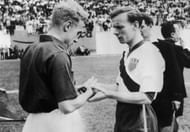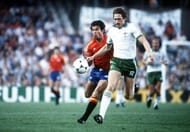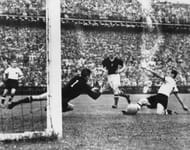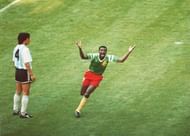The FA Cup may have made its reputation off the back of giant-killing results, but the World Cup has had more than its fair share. We cast an eye over five cities that have hosted five of the biggest games that shook the world.
A KOREA HIGH

The destination: Daejeon, South Korea
The game: South Korea beat Italy 2-1 (after extra-time), 2002
The stadium: The Daejeon World Cup stadium, known as the Purple Arena, still stands tall and is home to local side Daejeon Citizens. The city is South Korea’s fifth largest, with a population in excess of 1.5 million, and a road and rail hub making it easy to reach wherever you are in the country.
What happened: Engineered by Dutch tactical genius Guus Hiddink, South Korea pulled off arguably the biggest shock of the 2002 World Cup when they came back from behind to snaffle a golden goal that booted Italy out in extra-time of their quarter-final showdown. Irony of ironies, the winner was scored by Ahn Jung-Hwan who at the time was plying his trade for Serie A side Perugia. His goal didn’t go down too well, with club owner Luciano Gaucci telling press afterwards: “I have no intention of paying a salary to someone who has ruined Italian soccer.” Despite an apology Ahn opted to move to Japan that same summer. Hardly surprising really.
BRAZILIANT USA

The destination: Belo Horizonte, Brazil
The game: England 0-1 USA, 1950
The stadium: Built for the World Cup in 1950, the Estádio Independência was (changing rooms apart) completely reconstructed in 2010 and is now home to America and Atletico Mineiro.
What happened: England’s first appearance at a World Cup was nothing short of a disaster (yeah, start as you mean to go on) as the USA’s band of amateur brothers turned over the 3-1 favourites in a game that’s since been labelled the ‘miracle on grass’. On paper it should have been a walkover for the Three Lions who started with the legendary Tom Finney, Billy Wright, Alf Ramsey and Stan Mortensen and opted to rest Stanley Matthews. In contrast their opponents included a mailman, a paint-stripper, a dishwasher and a hearse driver. England totally dominated the game but for all their possession couldn’t find a reply to Haitian-born Joe Gaetjens’ scrappy goal on 37 minutes. It was a real backs to the wall performance after the deadlock was broken but somehow the minnows held out. Listeners on BBC radio thought the scoreline was an error when it was reported back in Blighty, while the New York Times dismissed the wire report as a hoax!
THE ITALIAN JOB
The destination: Milan, Italy
The game: Argentina 0-1 Cameroon, 1990
The stadium: Standing proud in the west of Milan the Stadio Giuseppe Meazza remains the home of Serie A giants Internazionale and AC Milan and has hosted everything from rugby to a Take That concert in recent years.
What happened: Nearly 74,000 packed into the San Siro to watch the opening game of Italia ‘90 as reigning champions Argentina took on Roger Milla’s Indomitable Lions. Knowing they had their work cut out the underdogs came with one clear tactic – to kick the crap out of the reigning champions (particularly striker Claudio Caniggia) and hope they could knick a goal. It worked a treat. Despite having André Kana-Biyik sent off just past the hour mark, the Africans stole a lead thanks to a downward header by his brother François Omam-Biyik on 67 minutes and somehow clung on even though they went down to nine men for more ridiculously over-zealous defending. The victory kick-started a run that took Cameroon to the quarter-finals. Their opponents weren’t unduly fazed by the early setback and made the final only to be defeated by West Germany.
THE PAIN IN SPAIN

The destination: Valencia, Spain
The game: Spain 0-1 Northern Ireland, 1982
The stadium: The Mestalla’s imposingly steep terraces should be empty by now but such is the state of Valencia’s finances that construction on their new stadium was halted during the recession and has remained untouched. Often used for the Copa del Rey final and for international games it’s well worth a visit.
What happened: It should have been an insurmountable challenge. Having never before beaten Spain and with just five goals in their previous 13 games, Northern Ireland needed to beat the 1982 World Cup hosts to stay in the tournament. Amazingly, they managed just that, stunning the Mestalla crowd into silence as Gerry Armstrong (he of Sky Sports La Liga co-commentary fame) started and finished a swift counter-attack to put the underdogs ahead early in the second half. An attacking onslaught ensued but even though Mal Donaghy was sent off for a second bookable offence the Spanish couldn’t find a way past veteran Arsenal keeper Pat Jennings. Such was the structure of the 24-team competition that the Irish proceeded to a second group stage where a draw with Austria and defeat to France nipped their adventure in the bud. A real shame, but they returned to Belfast with heads held high.
BERN, BABY, BERN

The destination: Bern, Switzerland
The game: West Germany 3-2 Hungary, 1954
The stadium: The amazingly named Wankdorf Stadium was, until 2001, the home of Young Boys before it was torn down and replaced by the new Stade de Suisse ahead of Euro 2008. Apparently rock band Muse credit the old arena as the inspiration for their song ‘Wankdorf Jam’.
What happened: The 1954 World Cup final is commonly referred to as ‘The Miracle of Bern’ and rightly remembered as one of the most controversial games ever played. On a 31-game unbeaten streak the Hungarians, spearheaded by ‘Galloping Major’ Ferenc Puskas, were outright favourites. Indeed, having already beaten their German opponents 8-3 in the group stages the game looked done and dusted when Hungary stormed to an early two-goal lead. However, by the 18th minute the sides were level before Helmut Rahn, scorer of the equaliser, pounced with six minutes to go to put the underdogs ahead. As the game edged towards its conclusion the drama climaxed in the pouring rain as Welsh linesman Benjamin Griffiths controversially ruled out a late Puskas effort before the Hungarians also had a stonewall penalty claim denied. The world learned a valuable lesson – never, ever, write off the Germans.

